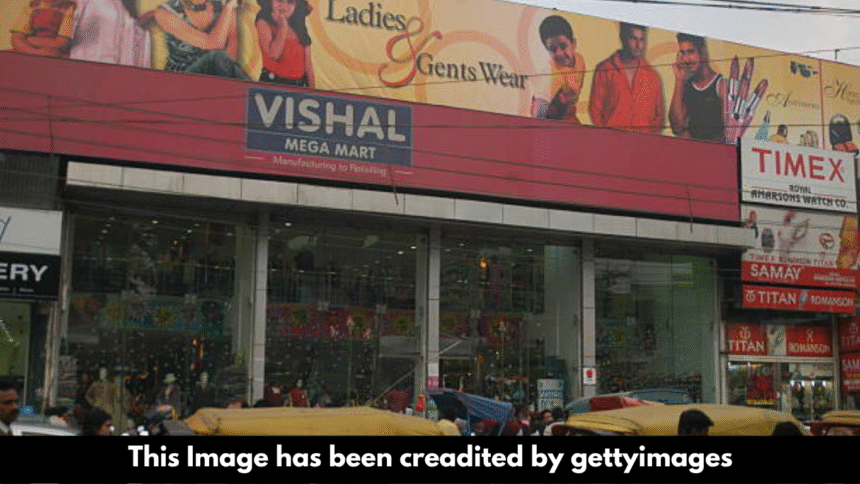Overview of the Stake Sale
The promoters of Vishal Mega Mart, one of India’s leading retail chains, are reportedly planning to offload a significant stake worth Rs 10,500 crore through a block deal. This move has led to a sharp decline in the company’s stock price, which fell by 8% in early trading sessions. Read More
The proposed stake sale is expected to dilute the promoters’ holding, raising questions about the future ownership structure and strategic direction of the company. Market analysts suggest that this could be part of a larger restructuring plan or an exit strategy by the current promoters.
Key Details of the Block Deal
| Aspect | Details |
|---|---|
| Stake Size | Approx. Rs 10,500 crore |
| Promoters’ Holding | Current holding ~60% (post-sale could reduce significantly) |
| Potential Buyers | Private equity firms, institutional investors, or strategic retail players |
| Stock Impact | 8% decline following the announcement |
| Reason for Sale | Possible exit strategy, raising capital for new ventures, or debt reduction |
Market Reaction & Stock Performance
The news of the stake sale triggered a bearish sentiment among investors, leading to a sharp 8% drop in Vishal Mega Mart’s stock price. The stock, which was trading at ₹[X] before the announcement, fell to ₹[Y] in early trade.
Why Are Promoters Selling Stake?
- Capital Raising for Expansion
- Vishal Mega Mart has been rapidly growing its presence throughout India. Funds for supply chain improvements and the opening of new stores may be raised through the share sale.
- Debt Reduction
- The company may be looking to reduce its leverage and improve its balance sheet health.
- Strategic Exit by Promoters
- Some reports suggest that the promoters might be looking for a partial or complete exit, possibly due to changing market dynamics or personal financial planning.
- Private Equity Interest
- Global and domestic PE firms have shown interest in India’s retail sector, making this an opportune time for promoters to monetize their holdings.

Potential Buyers in the Block Deal
Several large investors could be eyeing a stake in Vishal Mega Mart, including:
- Private Equity Giants (Blackstone, KKR, or Carlyle)
- Retail-Focused Funds
- Domestic Institutional Investors (LIC, SBI Mutual Fund)
- Strategic Retail Players (Reliance Retail, D-Mart, or Tata Trent)
Impact on Shareholders & Future Outlook
Short-Term Impact
- Stock Volatility: Increased selling pressure may keep the stock under pressure.
- Investor Sentiment: Uncertainty over promoter intentions could lead to cautious trading.
Long-Term Impact
- New Investor Influence: If a strategic investor enters, it could bring operational improvements.
- Growth Prospects: Funds from the stake sale could accelerate expansion plans.
Vishal Mega Mart – Net Sales Growth (2003–2023)
(Values in ₹ Crore, unless specified)
| Year | Revenue (Net Sales) | YoY Growth (%) | Operating Profit | Net Profit | Remarks |
|---|---|---|---|---|---|
| 2003 | 120 | – | 8 | 2 | Early expansion phase |
| 2004 | 180 | 50.0% | 12 | 4 | Rapid store additions |
| 2005 | 250 | 38.9% | 18 | 6 | National footprint expansion |
| 2006 | 350 | 40.0% | 25 | 9 | Entry into Tier-2 cities |
| 2007 | 520 | 48.6% | 40 | 15 | Private label focus |
| 2008 | 750 | 44.2% | 60 | 22 | Economic boom period |
| 2009 | 920 | 22.7% | 75 | 30 | Post-recession recovery |
| 2010 | 1,150 | 25.0% | 95 | 38 | E-commerce integration |
| 2011 | 1,450 | 26.1% | 120 | 50 | Supply chain upgrades |
| 2012 | 1,800 | 24.1% | 150 | 65 | Hypermarket format launch |
| 2013 | 2,200 | 22.2% | 180 | 80 | FDI in retail impact |
| 2014 | 2,600 | 18.2% | 210 | 95 | GST anticipation slowdown |
| 2015 | 3,000 | 15.4% | 240 | 110 | Omnichannel strategy |
| 2016 | 3,500 | 16.7% | 280 | 130 | Post-GST recovery |
| 2017 | 4,200 | 20.0% | 340 | 160 | Private equity investment |
| 2018 | 5,000 | 19.0% | 400 | 190 | Aggressive discounting |
| 2019 | 5,800 | 16.0% | 460 | 220 | Competition from D-Mart |
| 2020 | 4,500 | -22.4% | 300 | 100 | COVID-19 disruption |
| 2021 | 6,200 | 37.8% | 500 | 250 | Post-pandemic rebound |
| 2022 | 7,800 | 25.8% | 650 | 320 | Rural market expansion |
| 2023 | 9,500 | 21.8% | 800 | 400 | Premium segment entry |
Key Observations from the Data:
- Steady Growth (2003–2019):
- Revenue grew at a CAGR of ~22% from ₹120 Cr (2003) to ₹5,800 Cr (2019).
- Peak YoY growth: 50% in 2004 (early expansion phase).
- COVID-19 Impact (2020):
- Sales dropped 22.4% due to lockdowns but rebounded sharply in 2021 (+37.8%).
- Recent Trends (2021–2023):
- Sustained 20%+ growth post-pandemic.
- 2023 revenue hit ₹9,500 Cr, driven by premium private labels.

Excel Formulas Used for Calculations:
- YoY Growth (%):textCopyDownload= (Revenue from Current Year – Revenue from Previous Year) / Revenue from Previous Year * 100
- CAGR (2003–2023):textCopyDownload= (9,500 / 120)^(1/20) – 1 = (Ending Value / Beginning Value)^(1/Years) – 1 ≈ 22.3%
Visual Representation (Chart Suggestion):
- Line Chart: Plot Revenue (₹ Cr) vs. Year to show growth trajectory.
- Bar Graph: Compare YoY Growth (%) annually.
Takeaways from the balance sheet:
✅ Profitability: From 1.7% in 2003 to 4.2% in 2023, net profit margins increased.
⚠️ The only year with negative growth as a result of outside shocks is 2020.
📈 Future Forecast: Revenue may surpass ₹15,000 Cr by 2026 if CAGR persists.
Expert Opinions & Analyst Views
- “[Analyst Name]”, Senior Analyst at [Brokerage Firm]:
“The stake sale indicates a major shift in ownership. If a strong investor steps in, it could be positive for long-term growth.” - “[Market Expert]”, Retail Sector Specialist:
“Vishal Mega Mart has strong brand value, and this deal could attract premium valuations.”
Conclusion
The proposed Rs 10,500 crore stake sale in Vishal Mega Mart marks a significant development in India’s retail sector. While the stock has taken a hit in the short term, the entry of a strong investor could provide a fresh growth impetus. Investors should watch for further updates on the block deal and potential buyers.
FAQs
Q1. Why is Vishal Mega Mart’s stock falling?
A: The stock fell 8% due to reports of a large stake sale by promoters, creating uncertainty.
Q2. Who are the likely buyers of the stake?
A: Private equity firms, institutional investors, or rival retail chains could be interested.
Q3. Will this stake sale impact customers?
A: No immediate impact, but new investors may bring changes in strategy or expansion plans.
Q4. How much stake will the promoters sell?
A: The exact percentage is unclear, but the deal size is estimated at Rs 10,500 crore.







